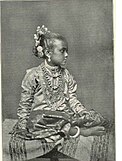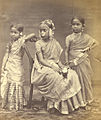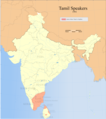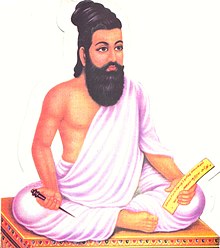Portal:Tamils
The Tamils portal
The Tamil people, also known as Tamilar (Tamil: தமிழர், romanized: Tamiḻar, pronounced [t̪amiɻaɾ] in the singular or தமிழர்கள், Tamiḻarkaḷ, [t̪amiɻaɾɡaɭ] in the plural), Tamilians, or simply Tamils (/ˈtæmɪlz, ˈtɑː-/ TAM-ilz, TAHM-), are a Dravidian ethnolinguistic group who natively speak the Tamil language and trace their ancestry mainly to India's southern state of Tamil Nadu, to the union territory of Puducherry, and to Sri Lanka. The Tamil language is one of the world's longest-surviving classical languages, with over 2000 years of Tamil literature, including the Sangam poems, which were composed between 300 BCE and 300 CE. People who speak Tamil as their mother tongue and are born in are considered Tamils.
Tamils constitute 5.9% of the population in India (concentrated mainly in Tamil Nadu and Puducherry), 15% in Sri Lanka (excluding Eelam Moors), 7% in Malaysia, and 5% in Singapore. From the 4th century BCE, urbanisation and mercantile activity along the western and eastern coasts of Tamilakam -- what is today Kerala and Tamil Nadu -- led to the development of four large Tamil empires, the Cheras, Cholas, Pandyas, Pallavas, and velirs and a number of smaller states, all of whom were warring amongst themselves for dominance. The Jaffna Kingdom, and vanni chieftaincies inhabited by Eelam Tamils, was once one of the strongest kingdoms of Sri Lanka and controlled much of the north of the island. (Full article...) Selected article -Tamil (தமிழ், Tamiḻ, pronounced [t̪amiɻ] ) is a Dravidian language natively spoken by the Tamil people of South Asia. Tamil is an official language of the Indian state of Tamil Nadu and union territory of Puducherry, and the sovereign nations of Sri Lanka and Singapore. Tamil is also spoken by significant minorities in the four other South Indian states of Kerala, Karnataka, Andhra Pradesh and Telangana, and the Union Territory of the Andaman and Nicobar Islands. It is also spoken by the Tamil diaspora found in many countries, including Malaysia, Myanmar, South Africa, United Kingdom, United States, Canada, Australia, New Zealand, United Arab Emirates, Saudi Arabia, France, Germany, Italy, Indonesia, and Mauritius. Tamil is also natively spoken by the Sri Lankan Moors. One of 22 scheduled languages in the Constitution of India, Tamil was the first to be classified as a classical language of India. Tamil is one of the longest-surviving classical languages in the world. A. K. Ramanujan described it as "the only language of contemporary India which is recognizably continuous with a classical past". The variety and quality of classical Tamil literature has led to it being described as "one of the great classical traditions and literatures of the world". Recorded Tamil literature has been documented for over 2000 years. The earliest period of Tamil literature, Sangam literature, is dated from c. 300 BC until AD 300. It has the oldest extant literature among Dravidian languages. The earliest epigraphic records found on rock edicts and 'hero stones' date from around the 3rd century BC. About 60,000 of the approximately 100,000 inscriptions found by the Archaeological Survey of India in India are in Tamil Nadu. Of them, most are in Tamil, with only about 5 percent in other languages. Tamil language inscriptions written in Brahmi script have been discovered in Sri Lanka and on trade goods in Thailand and Egypt. The two earliest manuscripts from India, acknowledged and registered by the UNESCO Memory of the World register in 1997 and 2005, were written in Tamil. (Full article...)General imagesSelected biography -Thiruvalluvar, commonly known as Valluvar, was an Indian poet and philosopher. He is best known as the author of the Tirukkuṟaḷ, a collection of couplets on ethics, political and economic matters, and love. The text is considered an exceptional and widely cherished work of Tamil literature. Almost no authentic information is available about Valluvar, states Kamil Zvelebil – a scholar of Tamil literature. His life and likely background are variously inferred from his literary works by different biographers. There are unauthentic hagiographic and legendary accounts of Valluvar's life, and all major Indian religions, as well as Christian missionaries of the 19th century, have tried to claim him as secretly inspired (crypto-) or originally belonging to their tradition. Little is known with certainty about his family background, religious affiliation, or birthplace. He is believed to have lived at least in the town of Mylapore (a neighbourhood of the present-day Chennai), and his floruit is dated variously from fourth century BCE to early fifth century CE, based on the traditional accounts and the linguistic analyses of his writings. Kamil Zvelebil infers the Tirukkuṟaḷ and Valluvar are best dated to around 500 CE. (Full article...)CategoriesTopicsTamil People Countrywide: India • Sri Lanka • Canada • Malaysia • Singapore • South Africa • England Related Ethnic Groups: Brahui • Gond • Kannadiga • Khonds • Kodava • Oraon • Malayali • Telugus • Tuluvas Related indigenous Groups: Badagas • Toda • Kuruba
See also: List of Tamil people, Tamil script, Tamil Script Code for Information Interchange Related portalsWikiProjectsThings to do
Associated WikimediaThe following Wikimedia Foundation sister projects provide more on this subject:
Discover Wikipedia using portals |
































































